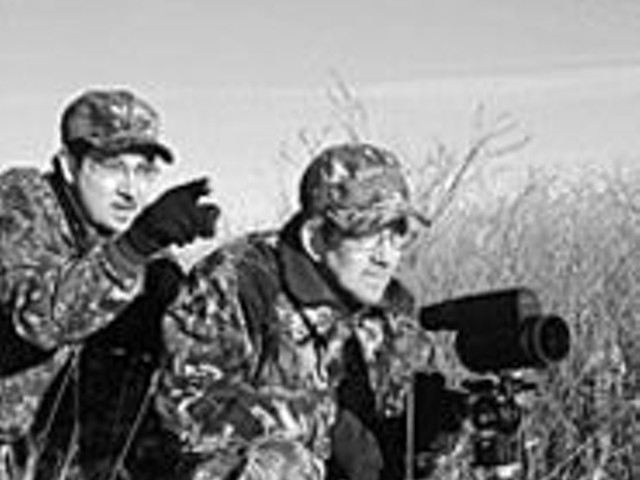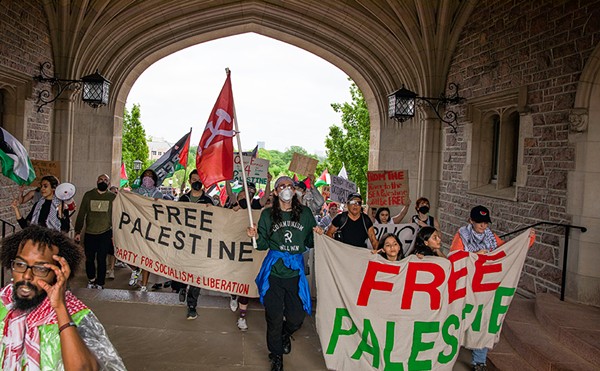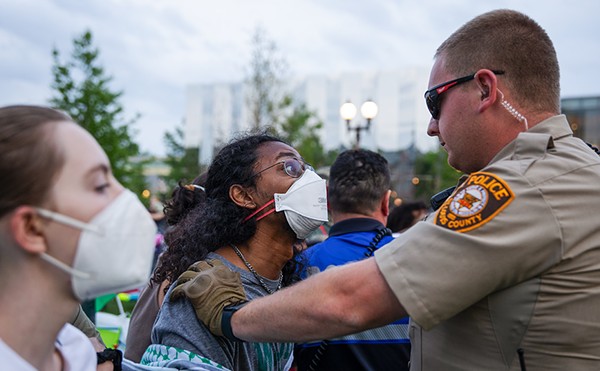A native of Brooklyn, Illinois, Henry lives just where he has for the past three decades: in a fourteen-by-sixty-five-foot Windsor mobile home (vintage 1975) on North Seventh Street, a short walk from Route 3 and the smattering of adult-entertainment establishments that serve as the downtrodden town's (population 600) lone economic engine.
Until 1991, the rectangular residence was, in its owner's words, "quite fashionable." That was then. Ripped upholstery is now: Henry, 74 years old and retired, makes do on a fixed income of $16,839 per year, thanks to Social Security and a small retirement pension gleaned from his years as a shop steward.
Clad in a white undershirt and jeans on a tattered couch in his dim living room, Henry, who suffers from diabetes and rheumatoid arthritis among other ailments, offers a brief assessment of Cardinals superstar Albert Pujols ("He's one bad-ass son of a gun"), then shuffles to his breakfast nook to pour himself a bowl of Quaker Oats. Prior to consumption, he pauses to recite a blessing:
Lord, help me if you can, to eat all that's in the poor man's pan
If there's any more left in the pot, please serve it to me while it's hot
Henry's day-to-day reality hasn't always been so stark. Strewn around this room are mementos from his days as an all-star infielder in the 1950s in baseball's Negro Leagues. Knee and arm injuries put an end to a two-plus-season stint holding down second base for the Memphis Red Sox at the dawn of the decade, but Henry resurfaced in 1955 with the storied Indianapolis Clowns franchise. Henry's showmanship at third base during two seasons in Indianapolis, a team that counts home-run king Henry Aaron among its alumni and is often compared to basketball's Harlem Globetrotters, earned him the nickname "Prince Joe." After sitting out 1957, Prince Joe was coaxed back to the diamond by Detroit Stars owner Ted Rasberry, who renamed his team "Goose Tatum's Detroit Clowns" after the famous Globetrotter and Negro League phenom.
"Joe Henry was a heck of a ballplayer," recalls Ollie Brantley, a teammate from Henry's Memphis years. "I thought for sure he was gonna get a shot to go play [in the majors]."
But like many black ballplayers of the 1950s, Henry didn't, for reasons no more complex than complexion. While Jackie Robinson's 1947 contract with the Brooklyn Dodgers signaled the end of the ban on black players in the major leagues, it did not usher in an immediate era of integrated baseball.
"Segregation and the color barrier didn't turn over at twelve o'clock midnight on April 15, 1947," says Negro League historian Larry Lester, referring to the day Dodgers general manager Branch Rickey signed Robinson. "It was a gradual transition. It took a couple decades to balance out in the minor-league and major-league levels. When Jackie Robinson retired [in 1956], there were still three teams without a black player."
That was the gist of Bob Mitchell's appeal to big-league commissioner Bud Selig's office after Major League Baseball in 1997 began paying $10,000 annual pension benefits to 69 ex-Negro Leaguers who played before Robinson broke the color barrier.
Mitchell, a Tampa resident who'd played for the Kansas City Monarchs during the 1950s, didn't get much of a response from the commissioner's office. Undeterred, he contacted U.S. Senator Bill Nelson of Florida, who enlisted the NAACP in the campaign.
The effort paid off: This past May 15, the Washington Post reported that Major League Baseball, in concert with its charitable arm, the Baseball Assistance Team (BAT), would administer approximately $1 million in monthly quasi-pension payments (totaling $10,000 annually over four years) to 27 former Negro League ballplayers who'd been excluded from the original group of 69 but had played in portions of four or more seasons before 1958.
The next day Joe Henry read a brief wire story in the Belleville News-Democrat and sent a letter to BAT executive director Jim Martin, noting that he met the stated criteria but had known nothing about the program before picking up that morning's paper. Soon afterward Martin sent Henry an application filled with questions about his Negro League tenure and current financial situation.
In a letter dated July 20, 2004, Martin rejected Henry's application. Though Major League Baseball had mentioned nothing about financial need with regard to the program, Martin noted that Henry's expenses (which he'd estimated on the form at $1,000 per month) didn't outstrip his monthly income of $1,403.
"For B.A.T. to provide assistance a financial need is required on behalf of the applicant," Martin wrote. "In reviewing your application, your income exceeds your expenses."
"He can't afford any expenses," scoffs Lester, who knows Henry personally. "A lot of ballplayers live like Joe does. I know what shirt they're gonna wear at the next reunion, because they only have one."
Henry persevered, sending Martin a five-page appeal restating his case for eligibility. A September 13 reply from BAT turned him down again, this time asserting that his playing career didn't meet the program's criteria.
Anthony Avitabile, MLB's director of industry risk management and financial reporting, says that since the mid-May announcement, the league has added players to the new plan, bringing the number of recipients to 32. Avitabile declines to disclose recipients' names, nor will he comment about individuals who were deemed ineligible for the program. But the Riverfront Times has interviewed ten ex-Negro Leaguers (including Bob Mitchell) who confirm that they are receiving monthly checks for $833.33 under the new program, as well as three former players who appear to meet the plan's criteria but aren't getting pension payments.
Along with Henry, fellow former Clown Clifford Layton, who played from 1951 through 1954, is not receiving any pension benefits. Nor is Don Johnson, who played from 1947 to 1952 with the Philadelphia Stars, Baltimore Elite Giants and Detroit Stars.
The three men have more in common than their outcast status. All live on fixed incomes at or below the poverty line. And none has ever kicked any money to Bob Mitchell's Communication Network of Negro League Players, the entity through which Mitchell solicits donations from ex-colleagues to defray costs associated with his ongoing efforts on their behalf.
Meanwhile, all but one of the players interviewed for this story who say they're receiving the new pension payments speak of Mitchell in glowing terms. The lone neutral party, Ollie Brantley, is also the only one of the group who hasn't contributed money to Mitchell.
"Ollie gave me his ass to kiss," Mitchell says of Brantley. "The [other] ones who are getting the money give it to me. They know that if I hadn't done what I'd done, nothing would have happened."
Country music stardom was actually Charley Pride's Plan B.
"I didn't intend to be in the Hall of Fame for singing," allows the 66-year-old Pride, who pitched and played outfield for the Memphis Red Sox, among other Negro League squads, in the mid-1950s. "I wanted to be the next Babe Ruth. My thing was baseball. I'm just glad the Lord blessed me with a voice to sing."
Pride is among the 32 ex-ballplayers receiving $833.33 per month for the next four years under Major League Baseball's new Negro League quasi-pension plan. What with royalties and concert appearances, Pride says, the payments are superfluous, so he uses the money to help his brother Mack, a fellow ex-Negro Leaguer who fell short of the minimum service requirement for the $40,000 windfall.
"I really didn't need it, but since they decided to do it -- I call it guilt money," says Pride, who has donated money to Mitchell over the years. "I look at it from the situation of Japanese internment: I think everybody who ever played, whether they played one game or two weeks, ought to get something."
The criteria for the ancillary plan appear to have been hammered out in late 2003 at Bob Mitchell's home in Tampa, during a meeting with Major League Baseball executive vice president Jonathan Mariner. Though Mitchell took a position much like Pride's, Mariner argued that the eligibility should resemble the 1997 plan, which required that players took part in four Negro League seasons. In addition, the league decided to make 1957 the last eligible year of service.
"The prevailing thought was that all major league teams were pretty much integrated at that time," Mariner says now.
Except they weren't: The Philadelphia Phillies didn't field their first black player until 1957. Ozzie Virgil became the first black Detroit Tiger in 1958. The Boston Red Sox were the last team to bring a black player aboard, in 1959. Even after that, Negro League play continued until the early 1960s.
"I don't know what the criteria were for choosing 1958 as the cutoff," says Larry Lester, who is currently under contract with the Major League Baseball Hall of Fame in Cooperstown, New York, to research and establish the definitive history of black baseball. "The league filed dissolution papers in 1960, so that's my cutoff date."
Mitchell sought out Lester to help establish which players would be eligible for the new pension payments -- an inexact science at best, given the spotty archives of Negro League box scores from the 1950s.
MLB's Avitabile says Mitchell submitted a list to the commissioner's office.
"Mitchell, at one point, put together a list of players who played at any time, and years of service," Avitabile says. "We picked the names off the list Bob had sent with four-plus years. That's where we started from."
According to Mitchell, that's where Prince Joe Henry got culled from the ranks.
"Larry [Lester] provided me the list that I went through to eliminate the barnstormers," Mitchell explains. "[The Indianapolis Clowns] were barnstormers. Their last official year was 1954."
Through much of the mid-1950s, the Clowns traveled with the New York Black Yankees and played exhibition games for amused throngs nationwide. But Larry Lester says the team's last official year was 1955. That was Joe Henry's first season with the Clowns -- and his fourth in the Negro Leagues.
"They were in the league in '55," Lester asserts. Noting that the Clowns weren't sanctioned in 1956 and 1957, the historian adds, "I would also consider '58 to be legitimate, because they were the Detroit Clowns."
"It is important for people to understand that the Clowns were really the only clown team that was ever part of the organized Negro Leagues," seconds Bob Kendrick, marketing director for the Kansas City-based Negro Leagues Baseball Museum, which Lester co-founded. "They did a lot of barnstorming, but what Negro League team didn't?"
Jim Zapp, who played with Willie Mays in Birmingham in the late 1940s, is among a handful of Negro League players who were overlooked back in 1997. After being granted the full pension package retroactively about a year ago, Zapp cut Bob Mitchell a check for $1,200.
"I gave him $1,200, but he seems to want more," Zapp says today from his home in Nashville. "He seems to be kind of angry with me."
"Zapp's money was just like any other person's money," Mitchell retorts. "The appreciation don't rise up the way it should. I sent out 54 letters two weeks ago."
Those typo-pocked mailings, which Mitchell dispatches on official-looking stationery in periodic fusillades, serve a dual purpose: to provide former colleagues with updates on what he's been doing on their behalf, and to ask for money.
An excerpt from an April 2, 2004 appeal: "At this juncture, I urge you to move on the above in the 'most timely manner; All checks you write 'must' be sent to me for and to assure distribution and your cooperation [...] Remember, 'you' wouldn't have received a red cent accept for the untiring efforts I've put forth with much sacrifice as many of you just waited patiently for this soon to come day.
"Remember, when you get this money, the Lord giveth, the Lord can take it awy. I'am the vessel that He are using to Bless you...think on that, for some have secretly criticized my efforts with doubts...you cannot know what I do every morning at four o'clock...while you are still sleeping??? Legend, let the conscience that God gave you...while you are now living be your guide...for the conscience is the voice of your spirit. Acknowledge at your will."
"You can tell his elevator don't go all the way to the top floor," Joe Henry says of Mitchell.
While acknowledging Mitchell's crucial role in bringing the recent $1 million pension program to fruition, Major League Baseball's Mariner won't discuss the ex-Negro Leaguer or his Communication Network, which is not registered in the state of Florida as a charity or for-profit enterprise.
Former Chicago American Giants pitcher Dennis Biddle is less reticent. Biddle is president of Yesterday's Negro League Baseball Players Foundation, a nonprofit that claims to represent the majority of living Negro League ballplayers, whose numbers are dwindling by the day.
"There were 314 [ex-Negro Leaguers alive] in 1995," Biddle reports. "Now between 120 and 130 men are still living. Ain't that many guys left."
Biddle believes the commissioner's office should have consulted his group in developing the new pension program.
"Major League Baseball has ignored me and the foundation that represents the players to go with some guy who's doing something for his benefit," says Biddle, whose group shares Charley Pride's view that all living Negro League players should be entitled to remuneration, length of tenure notwithstanding. "Bob is a member of our [group]. Bob should have turned it over to the foundation, but Bob was looking for self-preservation."
As far back as December 1995, Mitchell's unilateral lobbying caught the attention of legendary Negro League veteran Buck O'Neill, who as chairman of the Negro Leagues Baseball Museum's board of directors (a post he still holds) addressed a letter to all former players.
"Several players have been calling the Negro Leagues Baseball Museum concerning Bob Mitchell's request for money on behalf of an organization called the Communications Network," O'Neill wrote. "The creation of splinter groups, like the Communications Network, only serves to confuse people."
Count Prince Joe Henry and Larry Lester among those who remain confused.
"Joe should be there," Lester says. "He played from '50 to '52 with the Red Sox and '55 with the Clowns. That would give him the four years right there. And then you've got '58. Joe Henry was obviously a good ballplayer, and I don't think there's any question that he played, and he played a lot. In fact, he played more games than almost anybody in the league."





